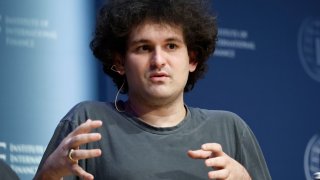
Elizabeth Holmes is headed to prison. Now, with Sam Bankman-Fried arrested on Monday by Bahamian authorities, the world is wondering if the FTX founder will follow in Holmes' footsteps as the next disgraced startup founder to end up behind bars.
These fallen founders, and others like them — from WeWork's Adam Neumann to Uber's Travis Kalanick — have something in common, and it's not just the prestige television shows being made about their collapses.
They're what happens when an enigmatic, passionate founder spins an impressive story about their startup — only for everything to later fall apart in a mess of exaggeration, deception and in some cases, allegations of outright fraud.
Were they simply masterful deceivers? Or, were there signs that might have pointed toward their deceptions and exaggerations sooner?
Get a weekly recap of the latest San Francisco Bay Area housing news. Sign up for NBC Bay Area’s Housing Deconstructed newsletter.
The answer is the latter, says Pamela Meyer, a Harvard-educated deception expert who is a certified fraud examiner and the author of the 2010 book "Liespotting: Proven Techniques to Detect Deception."
'Thinking errors' that kept us in the dark
It takes several critical "thinking errors" to be fooled by potential fraudsters, Meyer tells CNBC Make It.
Money Report
Those errors are easy to make. We often trust people offering "something we desperately want," like a potentially life-saving medical device or a way to get rich quick through cryptocurrency, she says.
It's easy to be blinded by traditional signs of legitimacy, like an elite education, Meyer adds. Holmes attended Stanford before dropping out to launch Theranos. Bankman-Fried's parents were both Stanford law professors, and he graduated from the Massachusetts Institute of Technology (MIT).
And there's an element of mob mentality: If people around you say someone is trustworthy, you're more inclined to trust them. It's far too easy to "unconsciously conflate familiarity with legitimacy," Meyer says.
Here are Meyer's "four key verbal indicators of deceit" that anyone can spot, whether you're talking to someone face-to-face or watching a public figure give an interview:
Protest statements
Be wary of anyone who falls back on a lot of "protest statements," Meyer says.
"Imagine someone across the table from you has put their hand up in the 'stop' position and says, 'But that's the wrong question to ask. Let me tell you why,'" she says.
It's a form of deception, and an indication that the person is trying to avoid a confrontational question — rather than responding with evidence that could clear things up and assuage your concerns about their truthfulness.
"When someone protests, take note," Meyer says.
Minimizing language
Fraudsters sometimes ward off probing questions by using "minimizing language," to downplay any concerns, Meyer says.
Bankman-Fried, for example, has blamed his own inexperience as a founder and businessman for FTX's downfall — while denying that he actually, purposefully defrauded any customers or investors.
As for the $8 billion in customer funds that remain missing, Bankman-Fried blamed the issue on "a poor internal labeling of bank-related accounts" in a Twitter thread apology he posted in November.
Bankman-Fried said he was "shocked" by what happened at FTX, while denying again that he committed any fraud, in an interview with CNBC's Andrew Ross Sorkin at The New York Times' DealBook Summit last month. He appeared to deflect some blame toward Alameda Research, the crypto hedge fund he co-founded.
Bankman-Fried did not immediately respond to CNBC Make It's request for comment.
"When minimizing is clustered with protesting and deflecting, you've got a sign to dig deeper," Meyer says.
Deflection
People who repeatedly change the subject when asked difficult questions raise an obvious red flag, Meyer says. But expert fraudsters can do this so well that you might not notice.
Holmes often deflected difficult technical questions about Theranos' hardware by telling stories about her great-great-grandfather, a surgeon who had a hospital named after him, Meyer says.
Or, Holmes would talk about her uncle who died of cancer, Meyer adds — and how he inspired Holmes' devotion for more easily testing people for deadly diseases.
Meyer also notes that Bankman-Fried often uses financial jargon in his interviews, which she calls "a deflection tactic."
And when first pitching FTX to investors, Bankman-Fried would reportedly play video games during pitch meetings, while insisting that the investors give him complete control. The New York Times described those meetings as "take-it-or-leave-it" offers.
Such tactics should have been "a red flag, for sure, that he was deflecting a deep dive into the details" of FTX, Meyer says. "Deflection can be verbal, but it can also be wag-the-dog tactical."
Convincing behavior
Take note when people suddenly switch from being cooperative and forthcoming "to 'convince mode,' where they shift to a pleading, persuasive tone," Meyer says. "What do you do, when someone shifts to this mode? You let them talk and talk and talk."
This appears to be Bankman-Fried's current mode, Meyer says.
The FTX founder has participated in numerous recent interviews, attempting to convince the public that he didn't intentionally mislead anyone, and that the downfall of his company was simply a result of poor oversight and honest mistakes.
But it's hard to trust those statements, Meyer says. After all, Bankman-Fried has admitted to very recently lying about several aspects of his life — including his devotion to effective altruism, political donation history and veganism.
"Most people exhibit patterns of deceit. Where there is smoke, there is usually fire," says Meyer. "When you interrogate someone and artfully ask, 'Is there anything else?' several times after they have claimed to come clean, it is remarkable how much else they come forth with."
Register for the CNBC Small Business Playbook virtual summit on December 14th. We'll provide actionable advice to assist entrepreneurs with strategic planning to navigate 2023 and uncover hidden opportunities to help businesses thrive in the new year. Registration is free. Sign up here.
Sign up now: Get smarter about your money and career with our weekly newsletter






